Lancaster University climate scientist talks Covid-19, the environment, air pollution and what a sustainable future might look like
and live on Freeview channel 276
Will seeing blue skies and breathing cleaner air for the first time in ages galvanise people into thinking and acting more sustainably?
Can there be a big shift towards working from home, reducing car journeys and CO2 emissions?
Advertisement
Hide AdAdvertisement
Hide AdSpending less money on consumer items, is that sustainable? What about those who work in production?
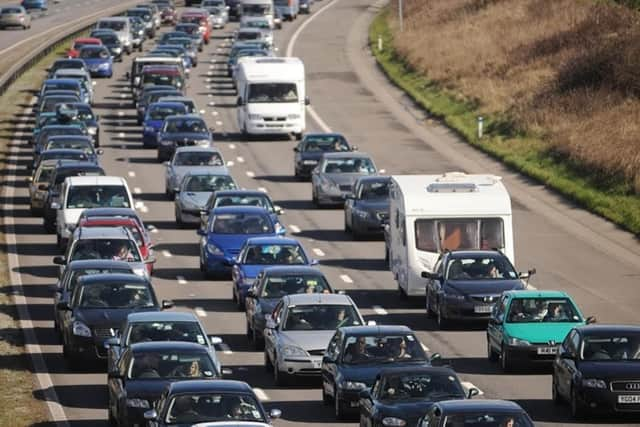

These are questions that Lancaster University climate scientist and senior lecturer Dr Paul Young doesn't necessarily have all the answers to.
But the associate director of the Pentland Centre for Sustainability in Business, who advises multi-national corporations like Nestle on climate change and sustainability, certainly hopes people will start thinking about it more.
It is estimated that the global lockdown response to the Covid-19 virus has reduced carbon emissions by around 5.5 per cent.
Advertisement
Hide AdAdvertisement
Hide AdThis has been reached by a reduction in road and air traffic, the closure of large sections of industry and business, and a lower energy need in general.
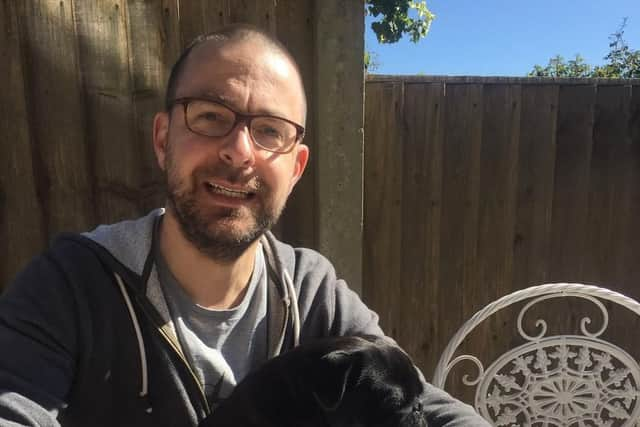

However, Dr Young points out that in order to hit Paris Climate Agreement targets, carbon emissions need to be reduced by between seven and eight per cent per year.
Given the huge, but temporary, changes already made, this implies a huge uphill battle.
Dr Young stressed that the current lockdown situation is not a good proxy for a transition to a low carbon/low pollution world as it is too reactive, with all sorts of impacts that will be felt more strongly by those less able to cope with them.
Advertisement
Hide AdAdvertisement
Hide AdBut he says that in the short term, air quality will improve, as pollutants such as nitrogen oxide in the atmosphere decrease.
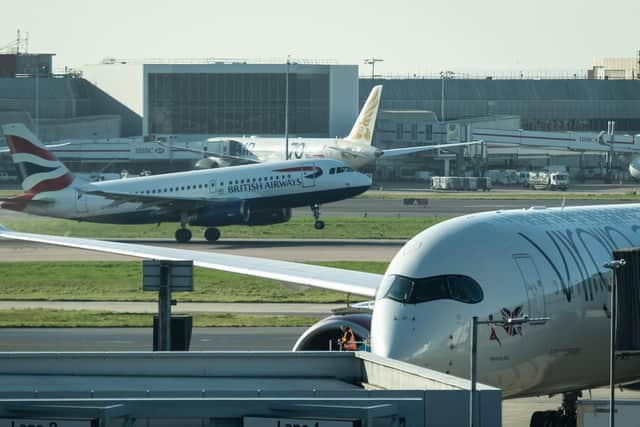

"Many places have seen major improvements in air quality," he said, "and that is going to have knock on effects for human and ecological systems."
"What we don't fully know yet is how much of the changes we can attribute to the lockdown, versus natural ups and downs due to the weather, and therefore whether we can associate what lockdown-driven changes in air pollution and what that would mean for illness and deaths.
"We hear about the risk of people getting ill in relation to air quality, people talking about more Covid-19 deaths happening in places where there is more pollution, but I think that's too early to say and those studies are missing details.
Advertisement
Hide AdAdvertisement
Hide Ad"Demographic factors haven't been added in, and there is a big rush in science for things to be published, but it needs to be quantified more robustly.
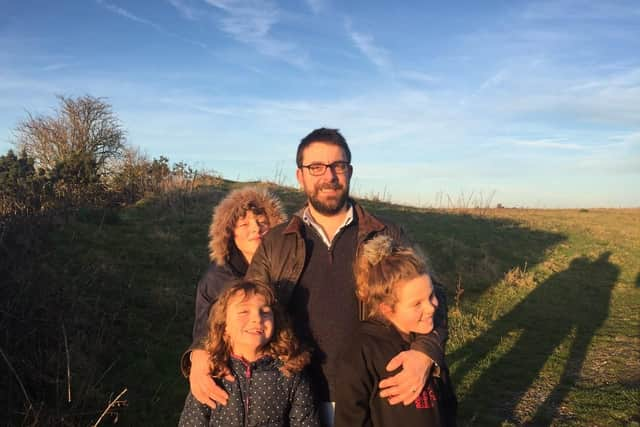

"But this is an urgent question at the moment, and very relevant when we think that we are still at risk from other pandemics that can affect the respiratory system, like flu.
"An open question is whether some components of air pollution – particulate matter – can act as vehicles (“vectors”) to spread the disease."
When and how we come out of lockdown and return to some sense of 'normality' raises questions for the environment.
Advertisement
Hide AdAdvertisement
Hide Ad"It's really interesting - will people really realise that they're experiencing cleaner air, and is that going to manifest itself into a pressure on governments to keep it that way?" Dr Young said.
"People who are experiencing blue skies for the first time in ages, what are they going to feel like when things return to the levels they were?
"It's more apparent in places like China - but even big cities around the UK and Europe - is it going to galvanise people to think greener?"
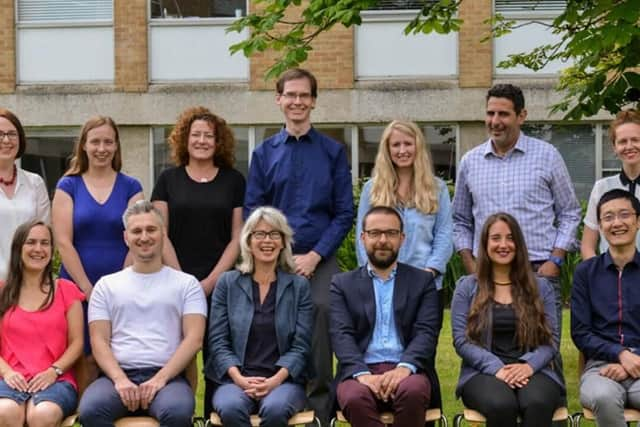

Whether air pollution makes people more susceptible to Covid-19 remains to be seen, but there is a direct and well established link between air pollution and respiratory health problems.
Advertisement
Hide AdAdvertisement
Hide AdIn terms of CO2 emissions, Dr Young says that a five per cent reduction due to global restrictions in movement is huge.
He said: "Carbon Brief makes the point that this is the largest drop in recorded history, but if we want to be on track for the Paris Agreement, and avoid dangerous climate change, then the reductions we require are more like seven to eight per cent per year.
"The lockdown has shown one way of what it's taken to get to five per cent but it is not a good proxy for a successful transition to a low pollution/low carbon world.
"It’s rather reactive and unplanned, with all sorts of consequences that are going to be felt more strongly by those less able to deal with them.
Advertisement
Hide AdAdvertisement
Hide Ad"One of the concerns is that when we bounce back we will do it stronger than ever, and there is concern that there will be a suspension of environmental regulations, so countries can push back harder and faster.
"It might wipe out any gains we have made and in terms of air quality that could be really bad."
Dr Young said the global pandemic has given us an idea of the scale of the response to climate and environmental breakdown.
He said: "It's giving us an idea of the scale of the response needed - and the interconnections of our world, and to make real changes, we need to make them globally.
Advertisement
Hide AdAdvertisement
Hide Ad"We have a chance to re-imagine the world - the jobs that we do for example - can we think about things differently?
"Spending less money on consumer items, is that sustainable? What about those who work in production? Can we move that work to something else?
"More people are thinking about how we move to an environmentally sustainable place in a socially just way.
"Moving to electric vehicles is good, but replacing all vehicles with them is not the best way to go about it I would say - we need to reduce the number of vehicles on the roads.
Advertisement
Hide AdAdvertisement
Hide Ad"There will be a huge rise in people working from home - a massive shift like this will reduce the number of commutes - and changing the hours people work in an office to stagger road travel - however there is of course a benefit from people working in the same space which will have to be balanced.
"Technologically - we're better prepared than ever for something like this - we've probably had hiccups, but the majority of people have still been able to work successfully from home."
Dr Young said that although air travel, proportionately, is not a big contributor to CO2 emissions - around two to three per cent - it is forecast to grow to become a third of all output emissions by 2050.
He said: "How do we square the benefits of engaging with other people and cultures (for work and holidays) with the need to get to zero carbon?
Advertisement
Hide AdAdvertisement
Hide Ad"There's a social justice issue here - as a nation we've enjoyed the benefits of being able to emit greenhouse gases for a long time - how do we allow the developing world to come up above the social floor and enjoy a good standard of living which is consistent with the Paris Climate Agreement?
"It needs to involve everybody - Kate Raworth's doughnut economics looks at ways we can approach this issue.
"If anything this crisis is allowing these voices to be heard."
Dr Young says that the best target in environmental terms is zero carbon output, but this has to take into account how we get our energy and how we produce our food on a global scale.
Advertisement
Hide AdAdvertisement
Hide AdLancaster City Council declared a climate emergency in 2019, meaning it is now aiming to become carbon neutral by 2030.
Kevin Frea, deputy leader of Lancaster City Council, said: "The council is working on improving the local economy and democracy as well as reducing carbon emissions, and all of these aims are given even more urgency by the current pandemic.
"Doughnut Economics inspires us to keep within planetary boundaries while making sure that there is an effective safety net for vulnerable people, and we will need all levels of government, as well as individuals, to come together to make this a reality."
Dr Young said: "There's lots of power in local action and environmental targets, as long as there are no competing targets - for housing for example - from central governments.
"There needs to be more joined up thinking there.
Advertisement
Hide AdAdvertisement
Hide Ad"You've also got multi-national businesses such as Nestle for example, who play a key part in this.
"When we think that businesses like this have presences in multiple countries, then they have the power to help instigate and set best practices.
"We were asked to present climate change scenarios to Nestle, and I've found that being involved in that, I was initially quite cynical, but I've come away feeling quite positive about the potential of business.
"The Nestle White Paper was about understanding the impacts of climate change on the company, and how it can think about how it operates in the future.
Advertisement
Hide AdAdvertisement
Hide Ad"All their sustainability people are people who want to effect positive change, and they are able to bend the ear of their CEOs.
"They wanted to understand the risk for them if they do or don't do something.
"Nestle have adopted a zero carbon strategy, and – although it could be strengthened – for them to do that is quite something.
"While businesses do have great potential, there are weaknesses in their direct accountability to society, so we need to involve and engage individuals of all ages, communities and different levels of government.
Dr Young added: "We're going to need all sorts of academic disciplines, science working with business, but also people and communities on the ground.
"It needs to involve everybody."